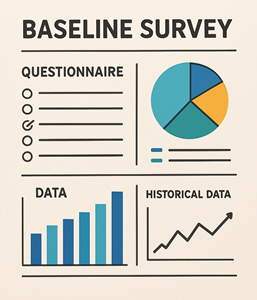
A baseline survey is a study conducted at the beginning of a project or program to establish a reference point or starting point for measuring progress and impact. It gathers data on the current situation before any interventions or changes are implemented, allowing for comparisons later to track changes and evaluate effectiveness.
• Purpose:
To understand the current status of a specific phenomenon or target population before any intervention.
• Timing:
Conducted at the very start of a project or program.
• Data Collection:
Involves gathering data through surveys, interviews, observations, or other methods to document the initial state.
• Reference Point:
Provides a benchmark for later comparisons and evaluations, helping to measure the effectiveness of interventions.
• Applications:
Used in various fields like project management, monitoring and evaluation, and research to track progress, assess impact, and guide decision-making.
• Measure Change:
They provide a clear baseline against which future changes can be measured, helping to determine the impact of interventions.
• Guide Interventions:
By understanding the current situation, baseline surveys can inform the design of interventions and ensure they are tailored to the specific needs of the target population.
• Track Progress:
They allow for ongoing monitoring of progress towards achieving project goals and outcomes.
• Evaluate Effectiveness:
They enable a systematic assessment of the effectiveness of interventions and the extent to which they have achieved desired results
© 2024 Pareekshn